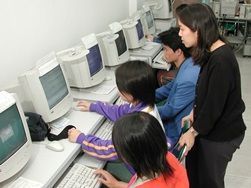
Equipping for Ministry - English
 For students in developing Asian countries, English is a necessary tool for passing college entrance and completion exams and entering a competitive job market. Due to globalization, English is also a necessary skill for economic advancement in almost every job sector. SEND International is not only committed to reaching the least reached, but mobilizing other workers around the world to join us in kingdom building. These two aspects of ministry fuel our innovative and creative English training center.
For students in developing Asian countries, English is a necessary tool for passing college entrance and completion exams and entering a competitive job market. Due to globalization, English is also a necessary skill for economic advancement in almost every job sector. SEND International is not only committed to reaching the least reached, but mobilizing other workers around the world to join us in kingdom building. These two aspects of ministry fuel our innovative and creative English training center.
The Center’s mission is to train evangelical English-speaking believers in a high-quality TESOL certificate program and to equip them for valued ministry throughout Asia, using English language teaching as a platform. Asia remains the home of the most unreached people groups (UPGs) in the world. Often these UPGs are in countries that are hostile to the gospel and to foreigners.
Many Asian Christians are responding the Great Commission and need a valued skill to enter creative-access areas. SEND strongly supports the mandate of “every nation to every nation.” We not only seek to engage UPGs, but we also equip believers of many nations to engage the unreached. This is the vision and mission of The Center. Recently, the director of The Center related how the training is being used to reach into unreached people groups in Asia.
“Yesterday I had the chance to meet up with two graduates from The Center: one graduated in 1999 and the other in 2009.
“Both are full-time workers reaching out to a minority Muslim people group. After decades of labor by Christian workers among this difficult UPG, there are still few believers. However, in talking with my two former students, it is evident that over the past four years, there has been a noticeable movement of God.
“Their target group has been children, youth, and their mothers. They started using English primarily as a hook at their community center, but English teaching has now multiplied into micro-finance, livelihood projects, and computer classes. There is an active youth group of 30 or more and 10 have made confessions of faith, understanding that Jesus is God.
“Many of them are seekers of the Truth. This decision is not one they make lightly for they know that it will change their lives. Some ask, ‘What will happen to me if I make a decision for Jesus? Will my family disown me? What will happen if my family forces me to marry a Muslim in a different part of the country?’ The most serious question of all comes later, ‘What if my family tries to kill me because of my decision to follow Jesus?’
“These are difficult questions to answer and only the power of God’s Word and the truth of the gospel can give these precious people the faith and courage to believe. It was so rewarding, though, to see that those who took the TESOL course are reaping a harvest.”
This is just a small glimpse of the effect The Center is having on missions in Asia and beyond. To date, more than 300 people have received TESOL certificates through The Center with more than half of them specifically using their TESOL skills in the Lord’s service. We've trained people from more than 20 countries, sending them to serve in more than 30 countries! Whether it is a young Chinese woman who needs a TESOL certificate to serve in Tibet or a Filipino who has a heart for Muslims, the tool of teaching English unlocks the door into communities and advances our reach into targeted unreached people groups.
Follow up with prayer
Pray for the center and its director. The center needs additional teachers and administrators. Pray for the provision of an administrator the director and his staff manage five-week training courses from the Philippines to Thailand to other East Asian countries year-round. Pray for wisdom as they plan their schedules and consider which opportunities they can agree to do.
Pray for the center's graduates who live and serve around the world. Pray specifically for those who have taken their training in English and are using it in missional outreach. Pray especially for those who are laboring among unreached people groups that are hostile to the gospel and who live in difficult to reach places.
Additional Posts




